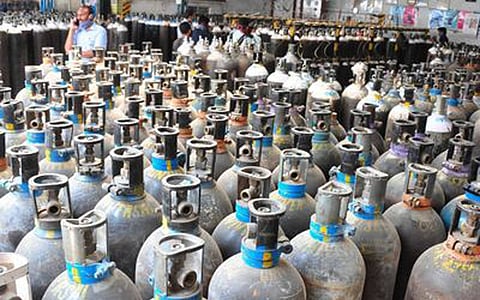The second wave of the pandemic in India has led to an unprecedented strain on the healthcare sector, leading to the loss of innumerable lives. One of the major reasons that led to the breakdown of healthcare was the shortage of oxygen in hospitals. In a bid to support hospitals and increase the inflow of oxygen, oil marketing companies, such as Indian Oil Corporation, Bharat Petroleum Corporation and Reliance Industries have pitched in by diverting high purity oxygen to hospitals. This move follows the government’s decision to prohibit the supply of oxygen for industrial use, except for nine select sectors, by manufacturers from 11 April – in view of the shortage of medical oxygen across hospitals due to a spike in Covid related casualties.
“IOCL has diverted the high purity oxygen used in its Mono Ethylene Glycol (MEG) unit to produce medical grade liquid oxygen at their refinery in Panipat,” says an IOCL spokesperson. “The throughput of the unit has been scaled down to serve the more critical cause. At present, IOCL is supplying 270 tonnes of liquid medical oxygen (LMO) per day to the hospitals in Delhi, Haryana and Punjab”.
IOCL is also converting 14 LNG tankers of 17 tonnes each into medical grade oxygen carriers, to strengthen the medical oxygen logistics in the country. By mid-May, over 20 road tankers and 25 ISO containers of about 820 tonnes combined capacity were pressed into action by IOCL.
Transporting oxygen
Meanwhile, over the next six months, IOCL will be making 10 cryogenic road tankers at its cryogenic plant at Nashik. These tankers are expected to help in transporting oxygen. BPCL’s Mumbai refinery too is in the process of supplying 40 tonnes of oxygen per day to the ‘jumbo’ Covid centre in Mumbai through a pipeline.
In addition, BPCL is also supplying 1.5 tonnes per day of medical oxygen to Kerala from its refinery in Kochi. In 2020, BPCL had supplied about 25 tonnes of medical oxygen, when the average daily cases of Covid had risen during October-November. The Kochi refinery has a provision to produce and store liquid oxygen of 99.7 per cent purity.
Similarly, Reliance Industries is producing over 700 tonnes of medical grade oxygen a day, which is being supplied free of cost, as a part of the company’s corporate social responsibility initiative. The oxygen is being sent to Gujarat, Maharashtra and Madhya Pradesh, bringing relief to over 70,000 ill patients. According to company sources, RIL intends to raise the production to 1,000 tonnes soon. The company had installed a plant to specially produce oxygen, after the acute shortage faced in the healthcare sector.
In line with its responsibility towards the frontline employees – fuel station attendants, LPG delivery persons, contract workers and truck drivers – IOCL has extended its medical insurance for another year. “IOCL had earlier contributed to the vaccination programme by supplementing the Cold Chain Equipment (CCE) infrastructure in Jammu & Kashmir, Tamil Nadu, Bihar and Manipur for storage and transportation,” informs IOCL. “Since the outbreak of the pandemic last year, we have spent nearly Rs300 crore to help the country fight the pandemic”.
To streamline the medical oxygen supply, IOCL has launched a single-window application – the Sanjeevani Express – which is equipped to enable real-time monitoring of liquid oxygen supply logistics. The single window platform has been created to help all stakeholders, including the ministry of road transport & highways (MoRTH), oil companies and other Central and state government agencies, to monitor allocation, dispatch and receipt of medical oxygen.
While the oil marketing companies have scaled up production and supply of medical oxygen, they have cut down on crude imports, due to reduced demand of fuels and higher stockpiles at the plants. It is understood that IOCL has reduced its processing capacity by nearly 85 per cent and this could be cut further as its plants in Gujarat, Mathura and Panipat are facing problems storing bitumen and sulphur.
The refineries were operating at 95 per cent capacity till April and began to slow down after lockdowns were imposed. Similarly, BPCL has cut its crude imports by 1 million barrels in May and will reduce purchases by 2 million barrels in June, a company official said.

